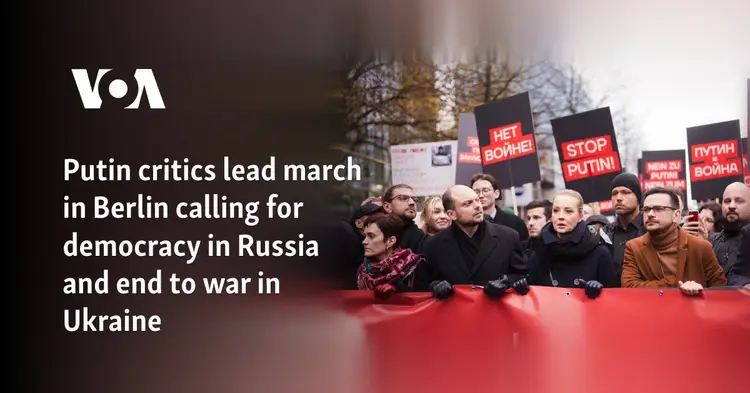Putin critics lead march in Berlin calling for democracy in Russia and end to war in Ukraine

Well-known Russian opposition leaders organized a march in central Berlin on Sunday, attracting a crowd of over 1,000 participants. They expressed their disapproval of President Vladimir Putin and his military actions in Ukraine while advocating for democratic reforms in Russia.
Under a banner stating "No Putin. No War," the demonstration was spearheaded by Yulia Navalnaya, the wife of prominent Putin opponent Alexei Navalny. Also taking the lead were Ilya Yashin and Vladimir Kara-Murza, who had recently been released from Russian imprisonment in a well-publicized prisoner swap over the summer.
The protesters yelled phrases like "Russia without Putin" and other slogans in Russian while displaying signs featuring various messages on a red background. Among these were statements such as "Putin = War" and "Putin is a murderer," written in German.
Some participants carried flags representing Russia and Ukraine, along with a white-blue-white flag associated with certain Russian opposition groups.
According to the event coordinators, the march started close to Potsdamer Platz and passed by both the Brandenburg Gate and Checkpoint Charlie, with the planned conclusion taking place outside the Russian Embassy.
The protesters issued a statement calling for the Russian military to leave Ukraine right away, for Vladimir Putin to be put on trial as a war criminal, and for all political prisoners in Russia to be freed.
Before the protest, Yashin stated that the participants were taking advantage of the freedoms available in Berlin to convey to the world that "a peaceful, free, and civilized Russia is real."
Navalnaya, Yashin, and Kara-Murza have promoted the rally on Sunday as a display of solidarity, especially during a period where tensions have been high within the anti-war movement.
The exiled anti-war opposition in Russia has mainly struggled to unite and present a coherent strategy.
The significant prisoner exchange between East and West in August resulted in the release of important activists and aimed to revitalize a movement that had lost its direction following the death of Navalny, a prominent anti-corruption advocate and fierce opponent of the Kremlin, while incarcerated.
Recently, tensions have increased significantly as Navalny's supporters and other well-known opposition figures exchanged allegations, which seem to have squashed any possibility of a cohesive movement against the Kremlin.
Numerous Russians who are critical of the current regime have expressed significant disappointment with the internal conflicts. They perceive that competing factions are trying to undermine each other and gain power.











































